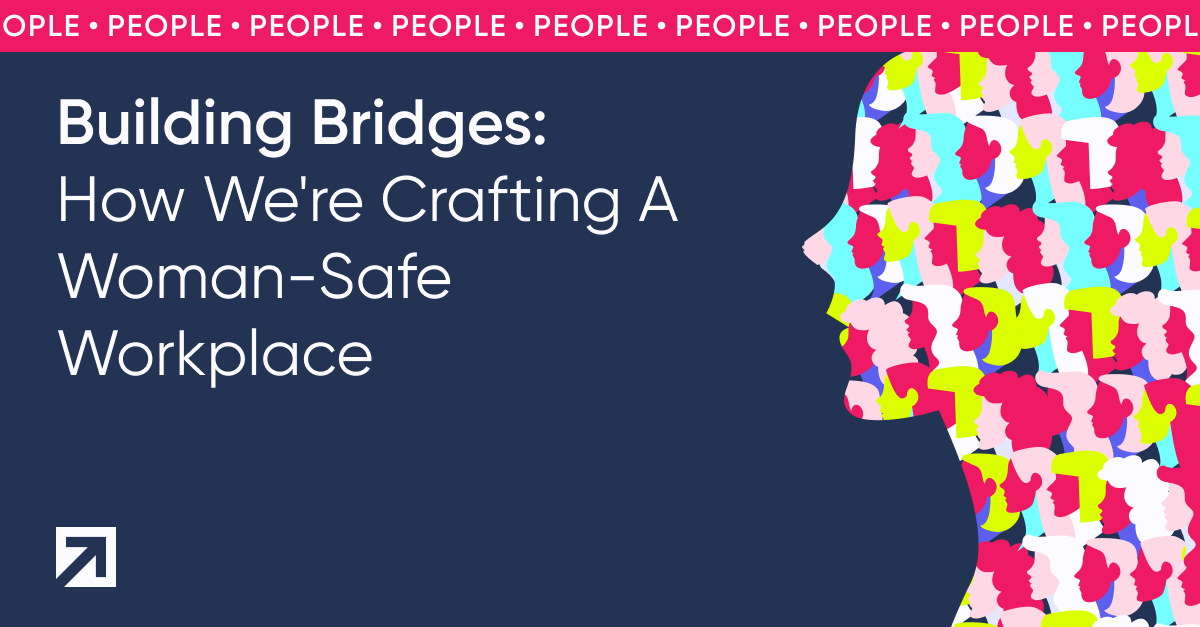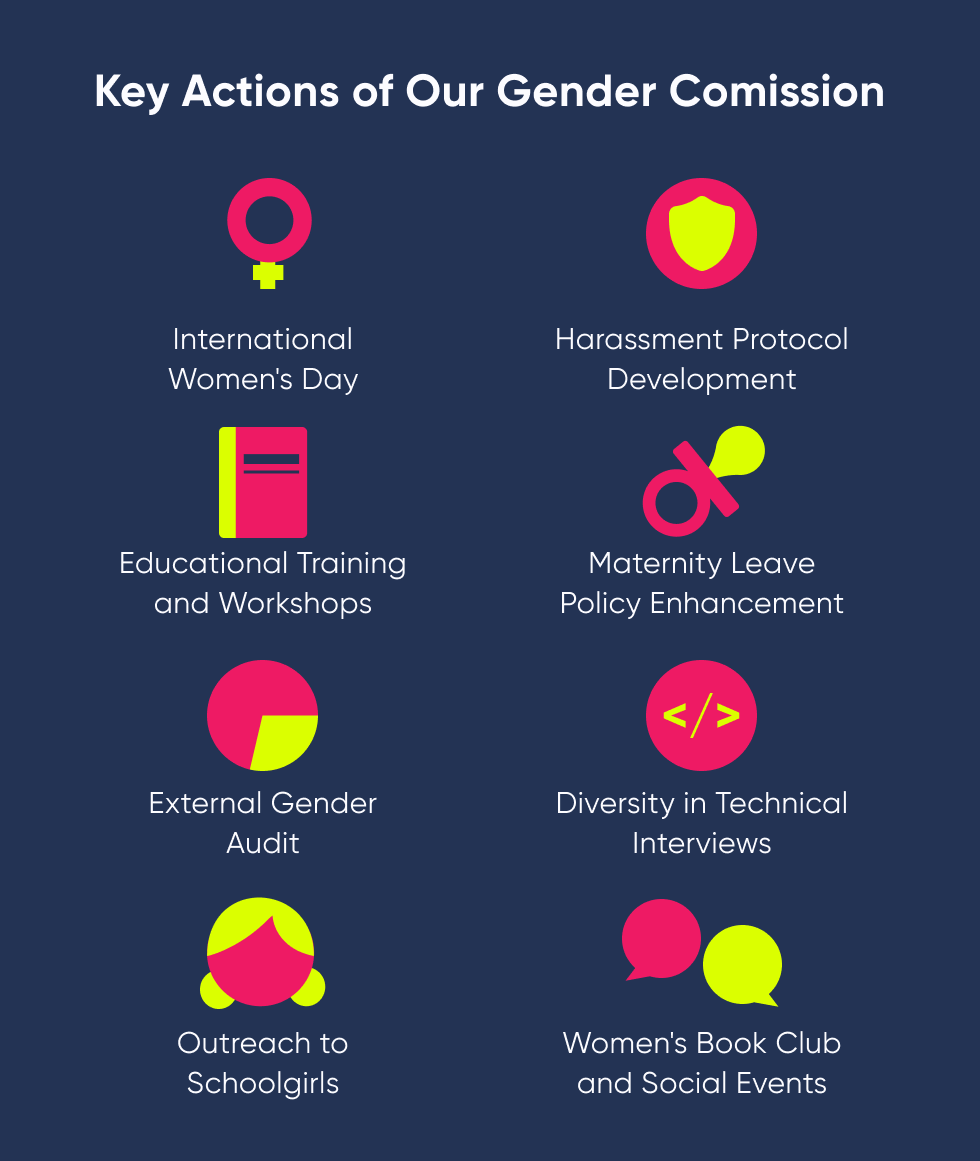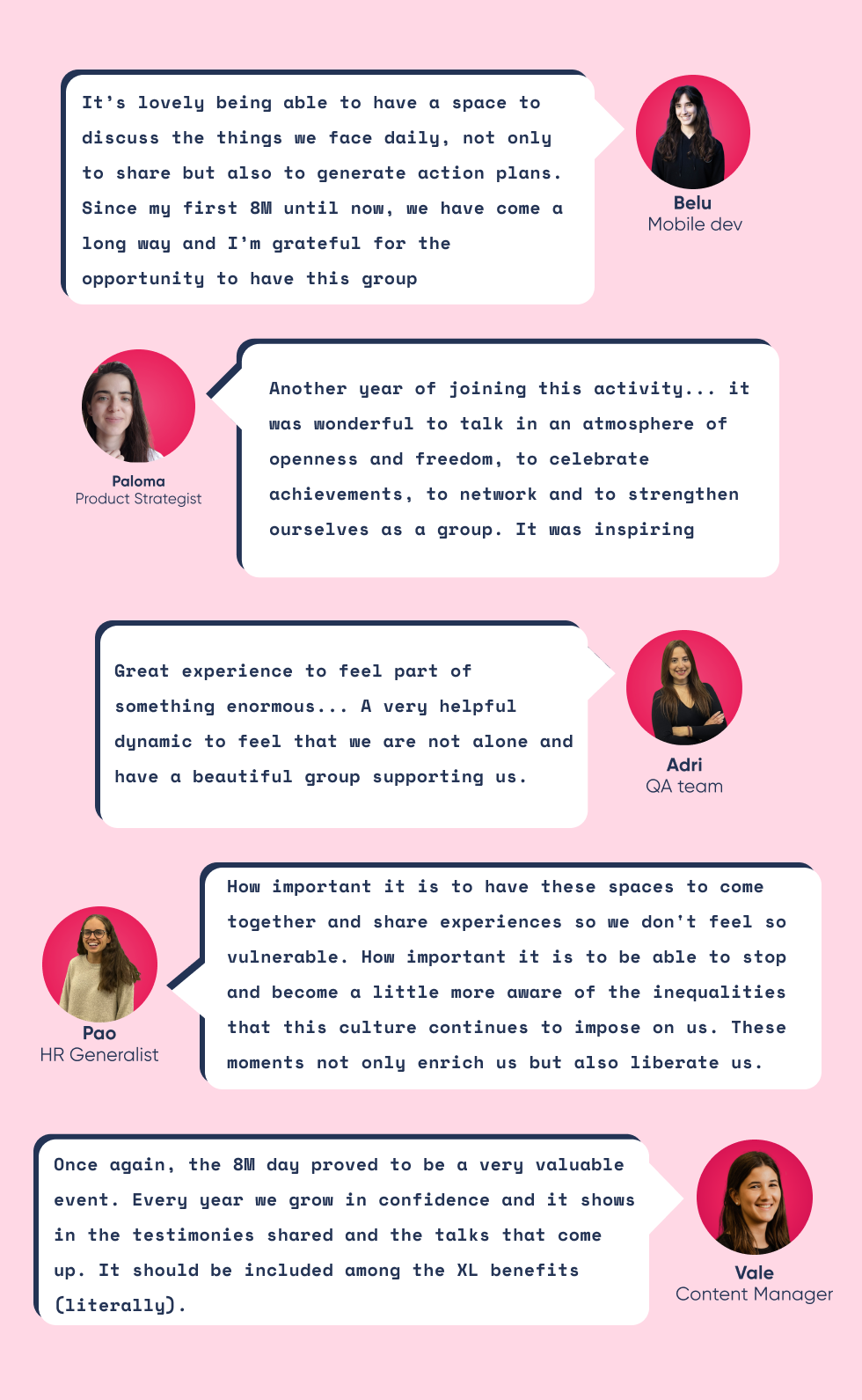

In a world increasingly dominated by technology, the Information Technology (IT) sector stands out as a rapidly growing field. Despite its evolution and expansion, this sector remains predominantly male, raising significant challenges and questions about inclusion and diversity.
Globally, women constitute less than 25% of the technology workforce. At Xmartlabs, the numbers reflect these broader industry trends, with women making up approximately 30% of the overall workforce and only 16% within the engineering team. These statistics underscore the need for initiatives focused on increasing female participation and fostering a more inclusive environment in IT and engineering fields.
Addressing gender issues is crucial, not just for equity, but also for fostering innovation and comprehensive team dynamics. A critical aspect of tackling these challenges is building networks among women, providing support, mentorship, and spaces to share experiences, essential for success in the male-dominated IT industry.
Challenges Faced by Women in the IT Sector
Despite significant progress in many fields, the IT sector continues to present numerous challenges for women. These challenges are not only barriers to entering the field but also obstacles to advancement and satisfaction within it. Understanding these issues is the first step toward creating a more inclusive and equitable work environment.
Systemic Barriers
The underrepresentation of women in IT starts with education and continues through career progression. Systemic barriers include gender stereotypes that discourage girls from pursuing STEM (Science, Technology, Engineering, Mathematics) education, a lack of female role models in the field, and biased hiring and promotion practices that favor male candidates. These systemic issues contribute to the gender gap in IT and discourage women from entering or remaining in the sector.
Workplace Challenges
Women in IT often face a work environment not fully supportive or inclusive of their presence. This can manifest in various ways, including:
- Gender Bias and Stereotyping: Preconceived notions about women's roles and abilities in technology can lead to microaggressions, underestimation, and exclusion from key projects or roles.
- Lack of Mentorship and Support: Without adequate support and mentorship, women may struggle to navigate their careers and access opportunities for growth and advancement.
- Work-Life Balance Concerns: The tech industry's demanding work culture can disproportionately affect women, especially those with caregiving responsibilities, making it challenging to balance professional and personal commitments.
- Harassment and Discrimination: Workplace harassment and discrimination remain significant issues, creating hostile environments that deter women from pursuing long-term careers in IT.
The Impact of These Challenges
The cumulative effect of these challenges is profound, affecting not only individual women but also the broader industry. It leads to lower participation rates of women in IT, decreased job satisfaction, and a loss of potential talent and diversity of thought in the sector. Addressing these challenges requires concerted effort and targeted initiatives to create a more supportive and inclusive industry for women.

The Strength of Networking Among Women
Establishing networks among women in the organization acts as a powerful support mechanism, allowing them to share experiences, insights, and strategies for overcoming professional hurdles. These networks:
- Strengthen Resilience: By sharing experiences and strategies, women can find collective solutions to common challenges, strengthening their resilience in the face of adverse work environments.
- Encourage Mentorship and Mutual Support: Networks provide platforms for mentorship, where more experienced women can guide newcomers, accelerating their professional development and strengthening their sense of belonging.
- Drive Organizational Change: When women effectively network, they can come together to advocate for significant organizational changes, promoting policies and practices that favor inclusion and gender equity.
Creating safe spaces and fostering support networks among women are critical steps toward building a more inclusive and equitable work environment in the IT sector. These initiatives not only benefit women in the industry but also enrich the organizational culture, promoting an atmosphere of respect and collaboration that is essential for success in the dynamic world of technology.
Weaving networks at Xmartlabs
At Xmartlabs, we began forging networks among women at the start of 2020. Throughout the year, we organized various activities for this purpose. But on March 8th, International Women's Day, we gathered to discuss our experiences, exchange ideas, and consider the changes we wished to see in the company.
The need to formally frame these initiatives and ensure their continuity led us, in 2022, to the creation of a gender commission. This step was taken to effectively follow up on the activities we had proposed, working in an organized manner towards the objectives set, and establishing a safe space that could also facilitate communication with management.
The initiative to form this commission stemmed from the need felt among the women at Xmartlabs for a mechanism that would allow them to channel their efforts and proposals more effectively, aiming to make a positive impact within the organization. Through this effort, we seek not only to address specific gender-related issues but also to promote a more inclusive and respectful work environment for everyone at Xmartlabs.
Key Initiatives and Activities at Xmartlabs
At Xmartlabs, our commitment to fostering gender equality and inclusiveness has driven various significant initiatives and activities. Spearheaded by the collective effort of women and the gender commission within our organization, these actions aim to create a more equitable work environment:
- International Women's Day: For the last four years, on March 8th, the women at Xmartlabs have dedicated the day to networking, engaging in equality-promoting activities, and setting objectives for the year, stepping away from our regular duties.
- Educational Training and Workshops: We've held sessions on gender issues and harassment for the entire company, aiming to build a foundation of respect and understanding across all teams.
- External Gender Audit: A thorough gender audit helped identify areas for improvement, guiding our efforts to create a more balanced and equitable workplace.
- Harassment Protocol Development: A harassment protocol was established to provide clear guidelines and support for addressing harassment incidents, enhancing our workplace's safety and inclusiveness.
- Maternity Leave Policy Enhancement: By formalizing maternity leave policies, we've ensured that our female employees receive the support they need during a significant life change, affirming our commitment to their well-being.
- Diversity in Technical Interviews: Efforts have been made to include more women in the technical interview process, contributing to greater gender diversity within our technical teams.
- Outreach to Schoolgirls: Organizing talks for schoolgirls highlights the career opportunities in tech, inspiring future generations to explore the field of technology.
- Women's Book Club and Social Events: Establishing a book club and social events for women at Xmartlabs has fostered a strong sense of community and belonging, encouraging personal and professional growth.
These initiatives, rooted in the passion and commitment of the women at Xmartlabs, reflect our ongoing efforts to champion gender equality and empower all employees.

Not a Smooth Ride: Anticipating Challenges
When dealing with gender issues, it’s common to confront deep-seated prejudices, biases, and beliefs that affect not just organizational cultures but society at large. Here, we outline the obstacles we've faced and anticipate the challenges ahead.
Challenges in Establishing a Gender Commission
Creating a gender commission within any organization can face a series of challenges that are critical to its successful implementation and effectiveness:
- Overcoming Cultural Resistance: A fundamental challenge is navigating the existing cultural resistance within organizations. This requires initiating open dialogues, fostering an educational environment, and gradually building a culture that prioritizes diversity and inclusion.
- Clarifying Scope and Responsibilities: It's essential to define the commission's exact scope, responsibilities, and placement within the organizational hierarchy. This clarity is crucial for empowering the commission with the necessary authority and resources to enact change and carry out impactful initiatives.
- Defining the Working Group and Involvement Criteria: Determining who will be part of the commission, including the criteria for their involvement, is a significant challenge. Decisions need to be made regarding the inclusion of men, whether they will be allowed to participate, and in what capacity.
- Establishing a Work Structure: Deciding on the commission's work structure, including how it will operate, communicate, and make decisions, is vital. This structure should facilitate efficient and effective progress toward the commission's goals while accommodating the diverse needs and schedules of its members.
Future Issues to Tackle
As we progress in our journey towards gender equality at Xmartlabs, several challenges persist that require our continuous attention and effort. Addressing these issues is crucial for creating a more inclusive and equitable environment for everyone in the organization.
- Empathy from Men: There's a pressing need for men within the organization to empathize with the gender-related challenges their colleagues face. Fostering a deeper understanding among men about these issues is essential for driving change.
- Men's Involvement in Gender Issues: Given that men continue to be the majority in many sectors of the tech industry, their active participation in gender equality initiatives is critical. Engaging men not only as allies but as active participants in these discussions and actions is vital for achieving comprehensive progress.
- Creating Spaces for Women to Exchange Ideas: Continuously generating spaces where women can share their experiences, challenges, and successes is crucial. These platforms not only serve as a support network but also empower women to voice their concerns and aspirations, contributing to the overall growth of the organization.
- Training, Especially for Leaders: Providing training focused on gender issues, particularly for those in leadership positions, remains an important challenge. These educational efforts are key to ensuring leaders are equipped to foster an inclusive environment, understand the nuances of gender dynamics within the workplace, and support gender equality initiatives effectively.
To Conclude: The words that really matter
Ultimately, the true measure of our efforts and progress lies in their tangible impact on the lives of the women at Xmartlabs. As we conclude, we wish to highlight what we consider our most significant achievement: the personal testimonies from some of the women who participated in this year's International Women's Day activities.


